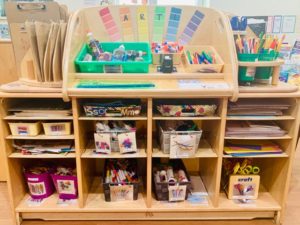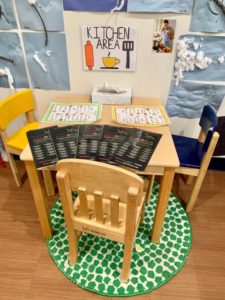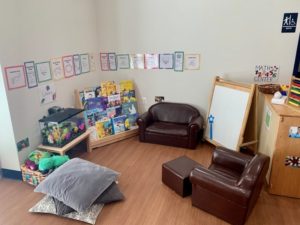At the Learning Tree we follow a curriculum called HighScope and we believe our children and teachers thrive in this approach and we would love to give you a little insight about why and how we teacher HighScope curriculum in our preschool classrooms.
In a HighScope preschool program, teachers ignite children’s interest in learning by creating an environment that encourages them to explore learning materials and interact with adults and peers. We focus on supporting early learners as they make decisions, build academic skills, develop socially and emotionally, and become part of a classroom community.
The biggest concept of our Highscope Curriculum is Active Learning. Active Learning is the foundation of children gaining and retaining the knowledge through their everyday tasks and interactions. So let’s take a look at 4 parts of Active Learning and our Highscope Curriculum.
Adult-Child Interaction
Teachers act as partners, working alongside children and communicating with them both verbally and nonverbally to encourage learning. Key strategies for adult-child interactions are sharing control with children, communicating as a partner with children, scaffolding children’s play, using encouragement instead of praise, and taking a problem-solving approach to supporting children in resolving conflicts.
Learning Environment
To create a predictable and active learning environment, teachers arrange and equip the classroom with diverse, open-ended materials that reflect children’s home, culture, and language. The room is organized and labeled to promote independence and encourage children to carry out their intentions.

Daily Routine
A consistent framework for the day provides a balanced variety of experiences and learning opportunities. Children engage in both individual and social play, participate in small- and large-group activities, assist with cleanup, socialize during meals, develop self-care skills, and exercise their small and large muscles. The most important segment of the daily routine is the plan-do-review sequence, in which children make decisions about what they will do, carry out their ideas, and reflect upon their activities with adults and other children. These higher-level thinking skills are linked to the development of executive functions, which are needed to be successful in school and life.
Assessment
Ongoing child assessment is also an underlying component of the HighScope Curriculum. Objective anecdotal observations of children collected throughout children’s natural play allow teachers to assess child progress and plan meaningful learning experiences.
